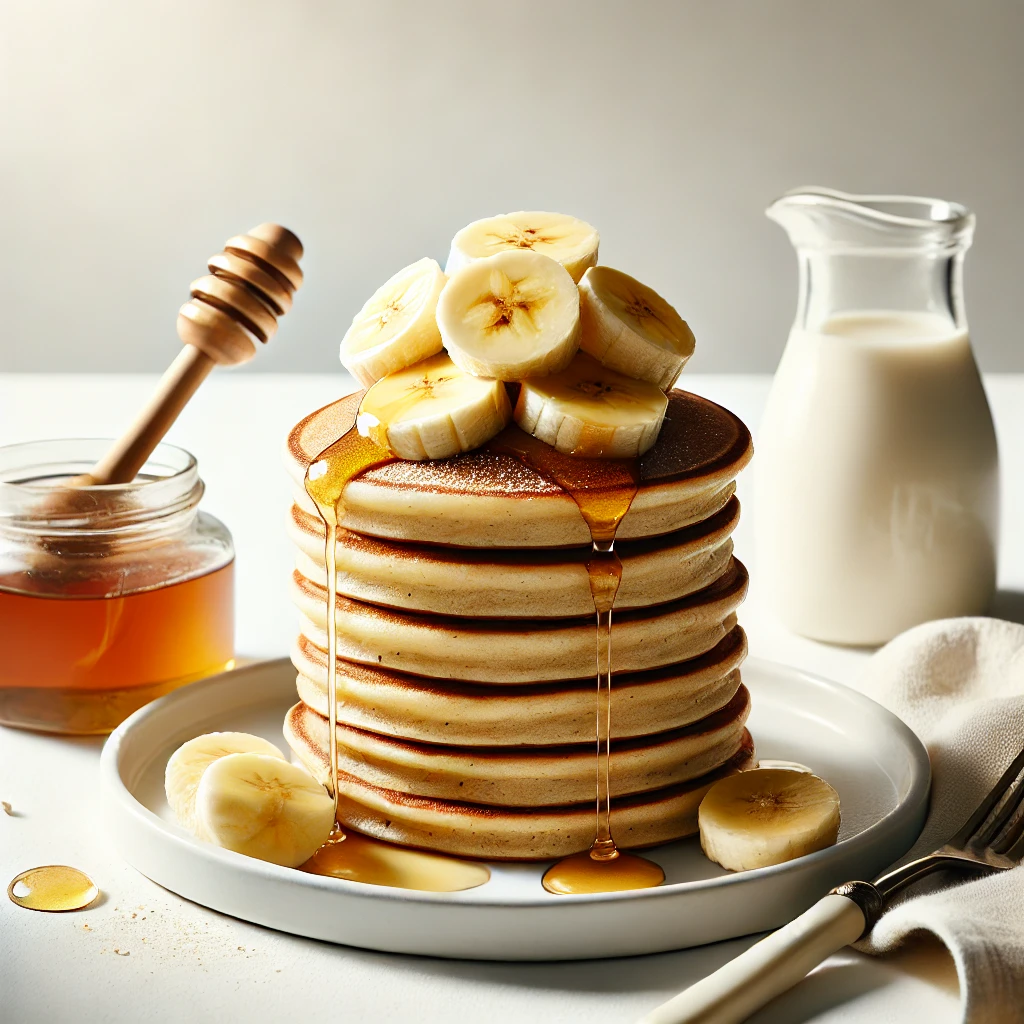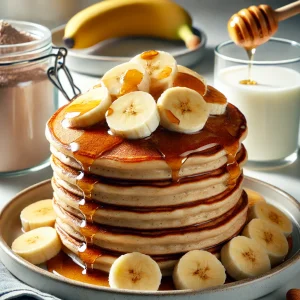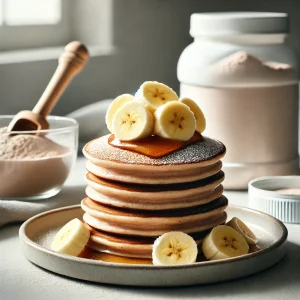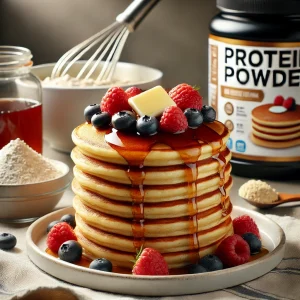Protein pancakes are a trendy breakfast option for those looking to boost their protein intake and maintain a balanced diet. But are protein pancakes truly a healthy choice? In this article, we’ll dive into the nutritional value of protein pancakes, explore potential downsides, and determine if they belong in your regular meal plan.
Nutritional Composition of Protein Pancakes
The most significant difference between protein pancakes and traditional pancakes lies in the protein content. Typically made with ingredients like protein powder, Greek yogurt, and eggs, these pancakes offer a much higher protein-to-carb ratio than standard pancakes.
This higher protein content supports muscle recovery and helps you feel fuller for longer, making it ideal for those who prioritize satiety and balanced energy throughout the day. For more information on nutritious breakfast options, you might also enjoy this guide to healthy filling breakfasts.
The Benefits of Protein Pancakes
Protein pancakes offer several health benefits, including:
- Muscle recovery: Protein helps repair muscle tissues, making these pancakes a great post-workout meal.
- Weight management: Thanks to their high-protein content, protein pancakes keep you satisfied longer, reducing the need for snacking throughout the day.
- Sustained energy: Combining protein, carbs, and fats provides a balanced energy source, perfect for a morning boost.
Want to know more about boosting your breakfast’s nutritional content? Explore these top toast toppings for more ideas.
Are Store-Bought Protein Pancake Mixes Healthy?
While homemade protein pancakes can be tailored to fit your dietary needs, store-bought protein pancake mixes may not always be the healthiest option. Many pre-made mixes include added sugars, preservatives, and artificial ingredients that could outweigh the health benefits of the protein content.
When choosing a store-bought mix, look for brands with simple, natural ingredients and no added sugars. Enhancing store-bought mixes with healthy toppings like berries, nuts, or Greek yogurt can also improve the nutritional value.
Homemade Protein Pancakes vs. Store-Bought
Homemade protein pancakes give you complete control over the ingredients, allowing you to choose whole foods and avoid additives. Using healthier ingredients like almond flour or oat flour can provide more nutrients than the refined flour often found in pre-made mixes.
For a balanced meal, consider using natural sweeteners like honey or maple syrup and incorporating fresh fruits. If you’re looking for a savory breakfast alternative, try this healthy breakfast curry recipe.
Potential Downsides of Protein Pancakes
Although protein pancakes offer numerous benefits, it’s important to avoid overconsumption of protein. Consuming too much protein can lead to digestive issues such as bloating, and in some cases, excess protein intake may put unnecessary strain on the kidneys.
Additionally, ensure that your protein pancakes are part of a balanced diet by incorporating fiber, healthy fats, and micronutrients. Adding chia seeds or flaxseeds to your pancake batter can help improve the fiber content.
Are Protein Pancakes Keto-Friendly?
If you’re following a keto diet, protein pancakes can still be a good fit. By using low-carb ingredients like almond flour and a keto-friendly protein powder, you can make pancakes that fit your macros.
Use low-carb sweeteners such as stevia or erythritol to maintain the keto balance without sacrificing flavor.
Gluten-Free and Dairy-Free Protein Pancakes
If you’re gluten or dairy intolerant, protein pancakes can easily be adapted to meet your dietary needs:
- Gluten-free options: Use almond flour, coconut flour, or gluten-free oats to create gluten-free pancakes.
- Dairy-free alternatives: Substitute Greek yogurt and milk with plant-based options like almond milk or coconut yogurt.
By swapping out a few key ingredients, you can enjoy delicious protein pancakes without compromising on flavor or nutrition.
FAQs About Protein Pancakes
Can I Eat Protein Pancakes Every Day?
Yes, but ensure variety in your diet to avoid overconsumption of protein without enough fiber and micronutrients. Incorporating fresh fruits or fiber-rich toppings can help keep your meals balanced.
Are Protein Pancakes Good for Weight Loss?
Yes, due to their high protein content, protein pancakes can help with weight management by keeping you fuller for longer.
Can I Use Any Type of Protein Powder in My Pancakes?
Yes, but be mindful of added sugars or artificial ingredients. Opt for clean protein powders with minimal additives for a healthier pancake.
Do Protein Pancakes Have More Calories Than Regular Pancakes?
Protein pancakes may contain more calories, but these extra calories often come from protein and healthy fats, which help provide longer-lasting energy.
How Can I Make Protein Pancakes Without Protein Powder?
You can make protein pancakes without protein powder by using Greek yogurt, cottage cheese, or egg whites to boost the protein content naturally.
Protein pancakes are a versatile and nutritious breakfast option, making them a great addition to a balanced diet. Whether you’re using them to support muscle recovery or simply enjoy a protein-packed meal, they can be easily customized to suit your dietary needs. For more inspiration on nutritious breakfast recipes, explore these fiber-rich meal ideas.



